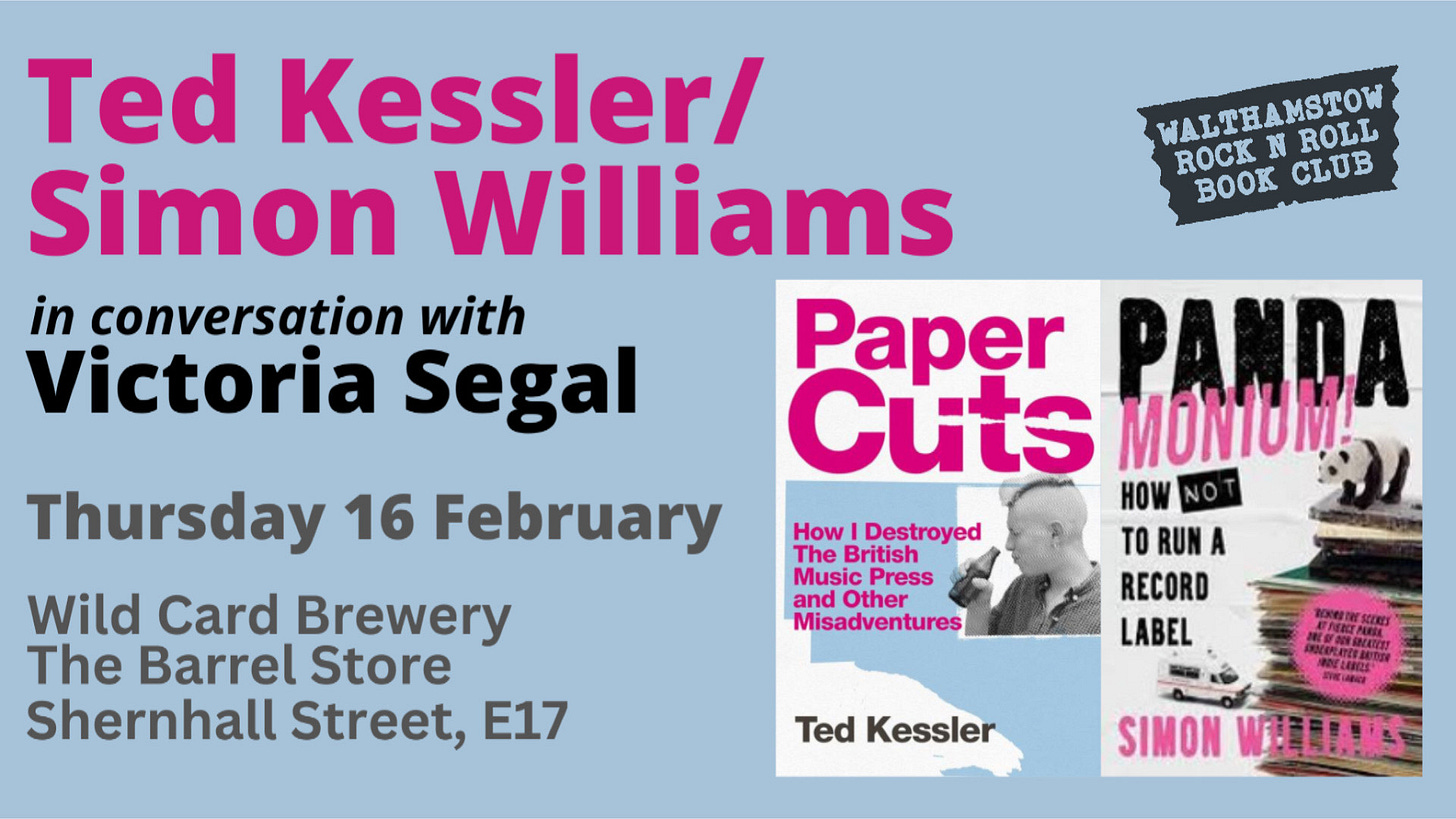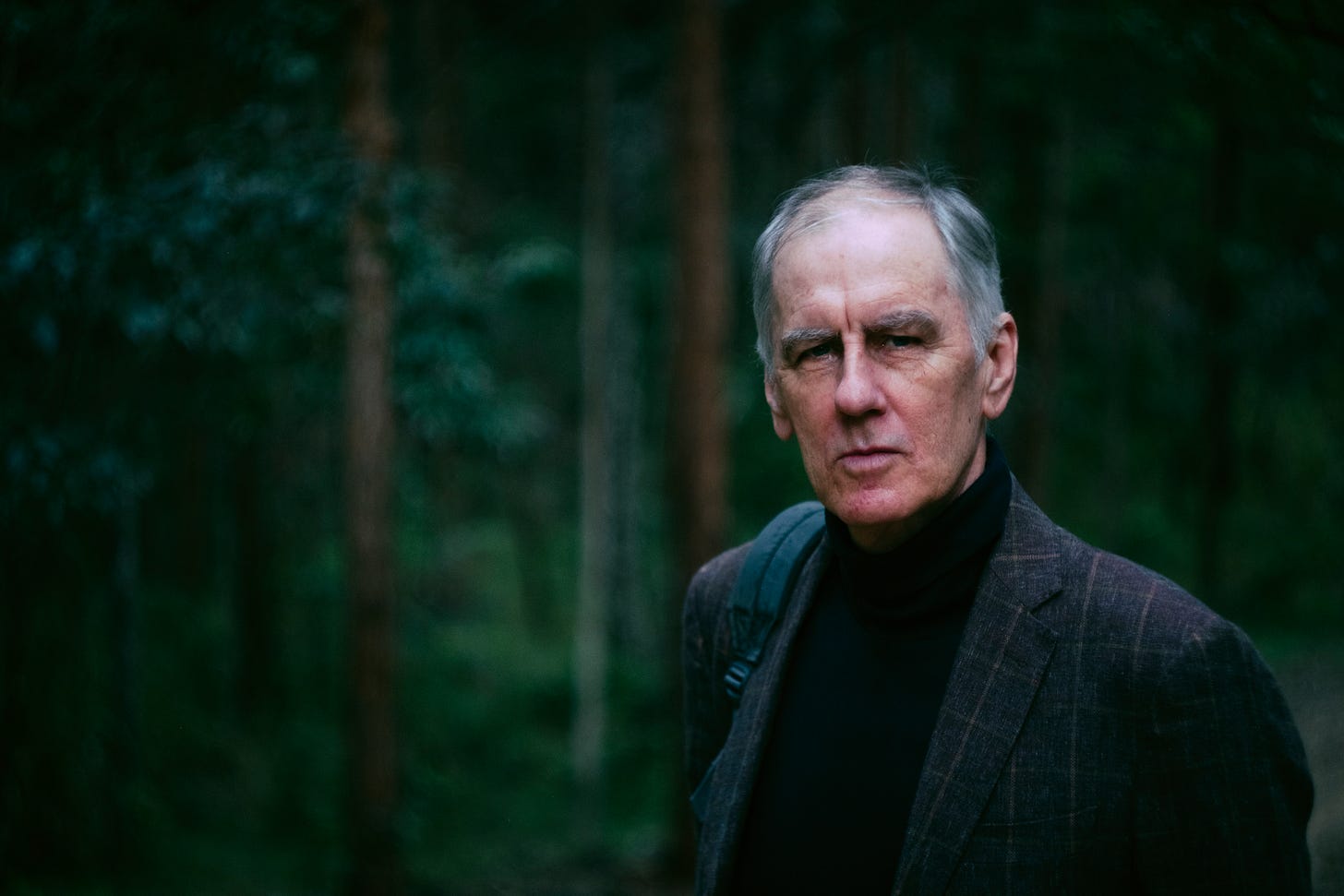Good morning,
We hope you had a good weekend, but whatever the verdict on it is we know we have the perfect Monday morning tonic for you in the shape of a lovely, touching interview with Aussie music legend and master song craftsman Robert Forster from The Go-Betweens. Before we get going, Ted’s just going to plug the event he’s doing this Thursday in Walthamstow, East London, alongside his former NME compadres Simon Williams and Victoria Segal. It should be a hoot. Tickets can be picked up here.
Before then, please enjoy this interview,
Ted, Niall and Chris
Start The Week With… Robert Forster
Robert Forster formed The Go-Betweens in Brisbane in 1977 with his best friend Grant McLennan. Though the band never quite broke through commercially, they made six albums of gorgeous, literary indie rock, with records such as 1986’s Liberty Bell And The Black Diamond Express and 1988’s 16 Lovers Lane now rightly regarded as classics. The group split up acrimoniously at the end of the 80s, but Forster and McLennan reunited in 2000 producing three more excellent Go-Betweens albums before McLennan died from a heart attack in 2006, aged just 46.
Though it might not be immediately apparent from its warm, gentle songs, there’s a shadow cast over Forster’s latest solo record, The Candle And The Flame. In 2021, his wife of over 30 years Karin was diagnosed with cervical cancer and the pair recorded the album together, along with their son Louis (of Aussie indie rockers The Goon Sax) while Karin was undergoing chemotherapy. Chris called up Robert at home to talk about the record, its difficult gestation but why ultimately it’s a record about celebrating love and life…
Hello Robert, how are you?
I’m good thanks.
What time is it there?
It’s eight o’clock. I’m just winding down.
Thanks for taking the time out of your evening to talk to us. Given the background to the album, how have you found it going over it all in interviews?
At times it’s a little bit confronting, going through all the details of Karin’s diagnosis and those sort of things. But overall, what I’m happy about is that I wanted to put out record that was vibrant, I wanted it to be joyous and people seem to feel that. We wanted this record to be a positive experience and not be heavy. I’d written eight of the nine songs before we started the recording process and before Karin’s diagnosis. The only thing I wrote after the diagnosis was She’s A Fighter. “She’s a fighter, fighting for good”. I’m happy to leave everything I’ve got to say about the diagnosis in a lyric in just those six words.
As a songwriter, was it something you didn’t feel comfortable writing about?
There really wasn’t much room for me to make music with what was going on. As soon as the diagnosis came through in early July 2021, I had no desire to write about what Karin was going through. We were so overwhelmed. I couldn’t put it into a song and I wouldn’t have had the time either because it was all hands on deck just going through the processes of chemotherapy. Running the house and dealing with everything, there was no time to create any sort of art or self-expression. But just watching Karin gather herself to go into chemotherapy and into the fight that she had to do inspired me: she’s a fighter fighting for good. And that’s all that I could really give.
Even though they were written before Karin’s illness, the rest of the songs really do feel like they’re looking back on your life together, your love and the journey you’ve been on.
It was amazing. We realised it immediately when we started. I was planning to do an album but I didn’t know when or how, so I hadn’t really thought about the songs and how they sat together because I’d written them over the three or four years. So when the diagnosis came and we started to play these songs together, we were struck by how much they reflected on the current situation and how there was quite a lot of our past as a couple, how we met and just the story of our lives, It was spooky. I can’t think of another batch of eight songs I’ve ever written in my life that so much reflected the situation that we found ourselves in.
I saw your son Louis played on the record too. What was it like having the three of you working together during that period?
Fantastic. He’s probably the musician who’s most on the songs. We’d played together a little around that the house over the years, but we’d never dreamed of making a record like this. Just before the diagnosis he was going to fly over to England to join The Goon Sax and do a tour in the second half of 2021. So he just cancelled the tour and decided to stay through the first six months of the diagnosis, and then the chemotherapy. He was coming over to see his mother and me every day and just check in on how things were going and he started playing along to these songs that Karin and I were playing at night. It became this way that for the three of us, when we played, everything else faded away like we were in this other reality. Which was just beautiful, playing music and songs and building parts together. You’re like, ‘How’s this? Let’s play it again, or let’s try it with this…’ You’re in the mechanics of the music, you’re not thinking about cancer, you’re in this lovely world.
Having a son who’s also in a band, given the pitfalls you experienced in The Go-Betweens, have you even given him any advice?
Not really. It’s always been a conversation about music. I don’t want to get into the mechanics of the music business with him. The conversation has always been more like, ‘Have you heard this? What do you think about that?’ Those sort of conversations have gone on with us for a long time.
How do you find it with new generations of musicians coming through over the years talking about The Go-Betweens and the influence you had?
I find it really nice. I’m flattered by it. I remember how I felt about Television and Talking Heads. I know that excitement I felt about them and to know that people are feeling the same way about us I find really moving. It’s a lovely, strange thing. You start to read things overseas and I see that The Go-Betweens are used as a reference point. You know when a review says this sounds like The Velvet Underground or this sounds like The Stone Roses or this sounds like Roxy Music… you immediately go, ‘Oh yeah, I know what that sounds like.’ The assumption is that the readers know what they sound like, so to see that our ripple went out and we’re understood in the music community is great.
You and Grant got back together in 2000 and recorded three albums that stand up with your best stuff from the ‘80s. Had he not passed away do you think you would have carried on?
I think we would have made some more, yeah. Grant’s writing was getting better and better and he was really fired up. I really don’t know how long it would have gone on but it would have carried on for a while. We were both aware that the band in the ‘80s made six albums. We’d done three and we were going to do a fourth. Maybe Grant would have wanted to do a solo record because he had a lot more songs than me. It’s very hard for me to predict. But we would have made a fourth album, we were planning to do that.
It's obviously incredibly difficult to lose someone that close to you. With hindsight, on a personal level, given how it ended in the ‘80s, to know that you’d reconnected with your oldest friend and that you’d made music together before he died must be a huge comfort?
Yeah, exactly. And there was a symmetry to it. Back in 1977 I asked him to start the band with me. He didn’t play an instrument so I taught him the first rudimentary songs that I’d just written. Then in May 1999, he asked me. He said to me, ‘I think we should start working together and reform The Go-Betweens.’ There was a symmetry about that, that I liked at the time. I’d asked him, and then he asked me, and so there’s two periods of the band.
Did you have any trepidation?
Yes, I did. I was aware the legend of the band was growing and that this was might be something that was not going to be easy. Grant wasn’t thinking about that. He was just like, ‘Yeah, let’s make a record. Let’s just do it…’ A good thing was that when he said that, I’d been writing songs and not recorded for a good few years so Grant hit me at a moment where I had a lot of good songs. That was another thing that pushed me on, knowing that that I had good material. We were confident that if we’re working together, and if we put together a really great band, that we could make great music. So it was like, ‘Let’s just go with it...’ Which was always the spirit of the band, anyway.
When was the last time you crossed The Go-Between bridge in Brisbane which they named in honour of the band?
It’s a toll bridge so I haven’t driven over it, but I see it all the time and the funny thing is that I see signs to it all the time. There’s all these highway signs to The Go-Between Bridge which is way stranger. I can remember getting a cab once and the cab driver asked me, ‘Do you want to go this way or should I go to The Go-Between Bridge? He obviously had no idea who I am or that I’m connected with the band. That was a real moment for me. When a cab driver says it, it’s got this other layer of meaning to it. It’s wonderful.
You should put that in a song.
Yeah maybe!
Thank you so much for talking to us Robert.
Thank you, enjoy your day.
CC





